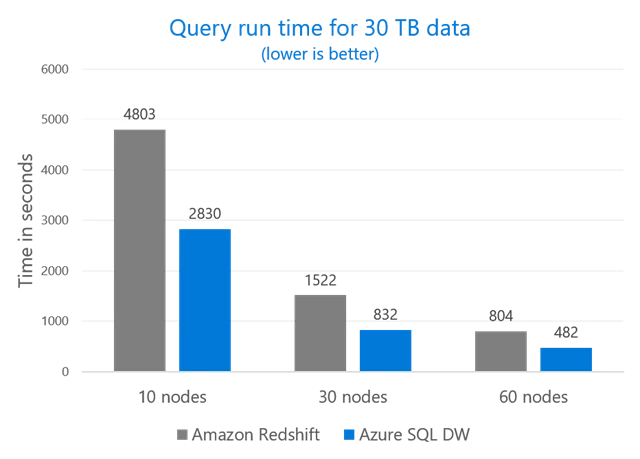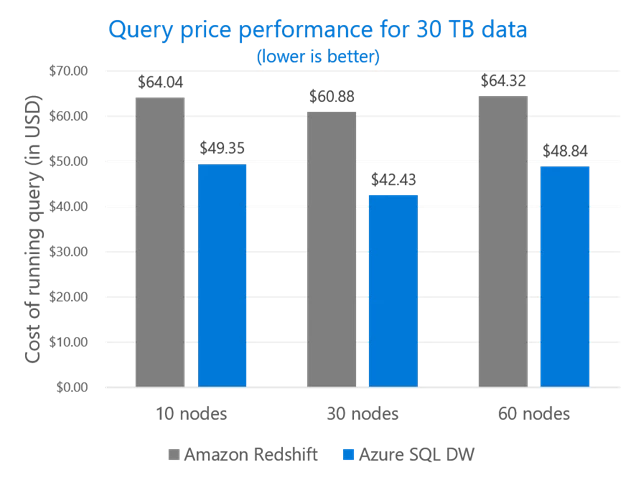As the amount of data grows exponentially, the pressure to quickly harness it for insights to share across the organization also increases rapidly. As Microsoft continues to evolve our analytics portfolio, we are committed to delivering a data warehouse solution that provides a fast, flexible, and secure analytics platform in the cloud.
Today we are excited to announce that Azure SQL Data Warehouse has set new performance benchmarks for cloud data warehousing by delivering at least 2x faster query performance compared to before. The key to this technical innovation is instant data movement, a capability that allows for extremely efficient movement between data warehouse compute nodes. At the heart of every distributed database system is the need to align two or more tables that are partitioned on a different key to produce a final or intermediate result set. Instant data movement in SQL Data Warehouse now accelerates this movement, resulting in faster query performance. You can learn more about how your query performance will improve from this blog.
Insights in minutes with Azure SQL Data Warehouse
We know that data makes every decision better, but decisions need to be timely to be competitive in the market. Fast decisions need a fast data warehouse. United Airlines differentiates itself in a highly competitive market by making its sales analytics widely accessible across the organization. However, until recently accessing the insights took up to a week. With the help from trusted partner Capax Global, United Airlines built a modern data warehouse solution on Azure to take advantage of the lightning fast query performance and massive query concurrency of Azure SQL Data Warehouse.
“By moving our on-premises data platform to Azure SQL Data Warehouse, we improved data loading by as much as 200x, which allowed us to provide faster access to data to our internal teams,” says Dan Black, Director for Sales Infrastructure at United Airlines. “Thanks to the benefits of the fully-managed Data Warehouse solution, we were able to get better performance on delivery of data, as we eliminated the burden and the cost of managing the environment. We can save over $20,000 a month.”
SQL Data Warehouse sets new industry standards
Building on the advances of Compute Optimized Gen2 tier like adaptive caching, Azure SQL Data Warehouse now sets benchmarks for two key customer criteria: query performance and query concurrency.
Query performance
To measure cloud data warehouse performance, Gigaom Research recently ran benchmark tests between Azure SQL Data Warehouse and Amazon Redshift using a workload derived from the well-recognized industry standard TPC Benchmark™ H (TPC-H).
According to the Gigaom research, Azure SQL Data Warehouse ran 30 TB workloads at least 67 percent faster than Amazon Redshift.

Beyond runtime performance, Gigaom also measured the price-performance ratio to quantify the USD cost of specific workloads. SQL Data Warehouse was at least 23 percent less expensive then Redshift for 30TB workloads. With SQL Data Warehouse’s ability to scale compute elastically as well as pause and resume workloads, customers pay only when the service is in use, further decreasing their costs.

This performance data is from Gigaom Research, and you can read this report to learn about other steps taken to ensure a fair comparison.
Query concurrency
Azure SQL Data Warehouse also ensures that data is accessible across your organizations. We have enhanced the service to support 128 concurrent queries so that more users can query the same database and not get blocked by other requests. In comparison, Amazon Redshift limits maximum concurrent queries to 50, limiting data access within the organization.
Azure SQL Data Warehouse delivers these query performance and query concurrency gains without any price increase and building upon its unique architecture with decoupled storage and compute.
Azure is the best place for analytics
Azure is the best place for organizations to unlock the insights hidden in their data to accelerate innovation with solutions for their specific needs. Customers can benefit from tight integration with Power BI, Azure Databricks, Azure Data Factory, and other Azure services for building end to end analytics solutions efficiently and more economically.
- Experience the performance of SQL Data Warehouse by creating your first instance.
- Contact Microsoft for a free data warehouse modernization assessment.
